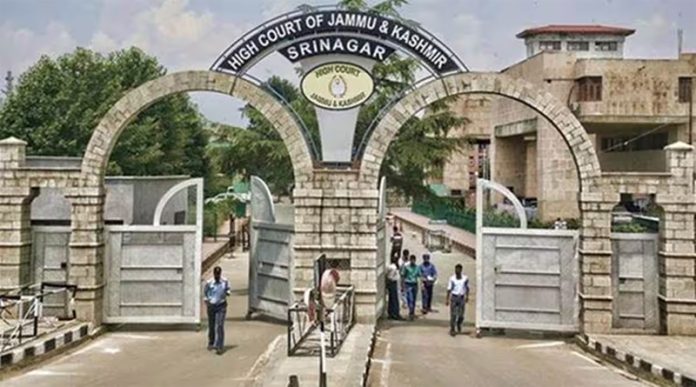Excelsior Correspondent
Srinagar, May 21: High Court today said that any benefit obtained by way of decree of court or on the act of a public servant by playing fraud is not sustainable in the eyes of law and upheld the quashing of mutation of migrant land by the court below.
Justice Sanjeev Kumar said that the proposition holds equally good in the case of such orders obtained from the revenue authorities or revenue courts by playing fraud or through deceitful means.
The land, which was subject matter of entire controversy, measures 01 kanal and 07 marlas situated at Village Kharman as per Jamabandi of 1971-72, was recorded in the ownership of one Niranjan Nath and Jia Lal and after the death of these two persons, the subject property was inherited by their legal heirs, Piyare Lal Raina and Ramesh Kumar Raina.
In the year 1990, they were forced to leave the Valley in the wake of the eruption of militancy. As it has come on record that on 7th February, 2000, they executed an agreement to sell in favour of Late Gul Bhat S/o Habibullah Bhat for a sale at consideration of Rs.1,20,000. The subject property, which is claimed by the private respondents, came into permissive possession of these private respondents and the process for seeking permission of the competent authority to effect sale was set in motion.
It was during the course of preparing the papers for seeking permission, it came to the notice of respondent Pyare Lal and Ramesh (the legal heirs of actual owner of the land) that there was some mutation under Section 8 of the Agrarian Reforms Act Mutation No.1082 dated 14th April, 2000, attested in favour of petitioners Raja Begum and others.
Feeling aggrieved, they filed an appeal before the Commissioner Agrarian Reforms, Anantnag, challenging mutation No.1082 dated 14th April, 2000. The Commissioner Agrarian Reforms accepted the appeal and set aside the impugned mutation.
The impugned mutation attested under Section 8 of the Act was held to be an outcome of fraud. The Commissioner Agrarian Reforms rejected the plea of the petitioners that the appeal was barred by limitation and held that there is no limitation to challenge an action which is an outcome of fraud. This was done by the Commissioner Agrarian Reforms vide order dated 4th October, 2107.
“It is abundantly clear that fraud vitiates all solemn acts and any instrument, deed, judgment, decree and order obtained through fraud is a nullity in the eye of law and such an order can be questioned at any time, so much so it can be ignored altogether before any court of law before it is questioned or produced in any proceeding”, Justice Kumar recorded.
Court added that once it is proved before the court of law that the order, instrument, decree or judgment brought before it, in any proceeding, is an outcome of fraud, the court of law shall forebear to endorse and perpetuate such fraud and any transaction which is the result of misrepresentation, fraud or deceitful means is not protected on the ground of limitation.
“The court of law is under an obligation to refuse to give effect to such order, decree or judgment passed by any authority, much less to endorse or acknowledge it. The Commissioner Agrarian Reforms and the Tribunal have appreciated this aspect in its correct perspective and have rightly set aside the mutation under Section 8 attested in favour of the petitioners without there being any mutation qua the subject land attested under Section 4 of the Act”, Court added.
“The Revenue courts below have clearly unraveled a fraud committed by the petitioners in connivance with the then revenue officers. There is fallacious reference made to a mutation under Section 4 of the Act which, admittedly, pertains to some other land and has been attested in favour of some other persons”, reads the judgment.
Court concluded that neither the petitioners were entitled to be recorded as prospective owners under Section 4 of the Act nor were they eligible to be conferred the ownership rights under Section 8 of the Act and viewed that the Court does not find it a fit case to interfere with the concurrent finds of fact returned by two revenue courts below, more so when such findings have not been found suffering from any perversity.


